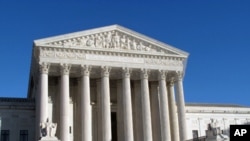Despite apparent skepticism by several U.S. Supreme Court justices, Nigerian activists and proponents of corporate accountability say they are confident that the giant petroleum firm Shell will face charges in the United States for alleged human rights violations.
Seventeen years after nine Nigerian environmental activists were executed by the military in the oil-rich Ogoni region with the alleged complicity of Shell officials, the nine justices of the Supreme Court of the United States heard arguments Tuesday on whether the Anglo-Dutch company can be held accountable in the United States.
The case is Esther Kiobel versus Royal Dutch Shell. Kiobel is the widow of one of the anti-Shell protesters who was executed in 1995. Shell settled a similar case for $15.5 million shortly before it went to trial in a New York federal court in 2009.
On Tuesday, Supreme Court Justice Samuel Alito wondered why this latest case was being discussed in Washington because it had been brought by foreign plaintiffs against a foreign defendant for acts allegedly committed outside of the United States.
Justice Anthony Kennedy, whose vote often decides closely contested cases, expressed concern that a ruling in favor of the plaintiff could open up American companies to similar actions in other countries.
Nigerian activists celebrated their day at the Supreme Court, saying they will keep on fighting for justice, regardless of the court's decision, which is expected by the end of June. They said they want the case to be heard in the United States because they do not think they can get a fair trial in Nigeria.
Marco Simons, legal director of the Washington-based advocacy group Earthrights International and a strong proponent of corporate accountability, says he is optimistic.
"I did not hear anything that fundamentally changes the outlook of this case," said Simons. "Some [U.S.] judges have views that a corporation should not be subject to suits for violations of international law. But we are quite optimistic that that will not be the view of the majority of the justices on the Supreme Court."
The plaintiffs are attempting to use the 1789 Alien Tort Statute, which allows U.S. courts to hear cases brought by foreigners for violations of international law and U.S. treaties. The question is whether corporations can be prosecuted under the statute.
Shell's representative Kathleen Sullivan repeatedly told the nine justices that the Supreme Court should reject corporate liability because there is no precedent in international law courts and conventions.
Afterward, Simons said that even if corporate accountability is not recognized in the case, it does not mean the end of lawsuits against corporations for violations outside of the United States.
"It is just that these cases will be more likely to be heard in state courts rather than federal courts, and would be heard under different labels," he said. "Essentially, instead of calling the case a case against torture or crimes against humanity, it might be about assault and battery, for example."
Similar cases going through the U.S. court system include an attempt to hold U.S.-based oil companies ExxonMobil and Chevron accountable for alleged human rights abuses in Indonesia, as well as cases against several U.S. companies for their alleged role in assisting the South African government during the apartheid era.
Nigerian Activists Press US Supreme Court Case Against Shell




